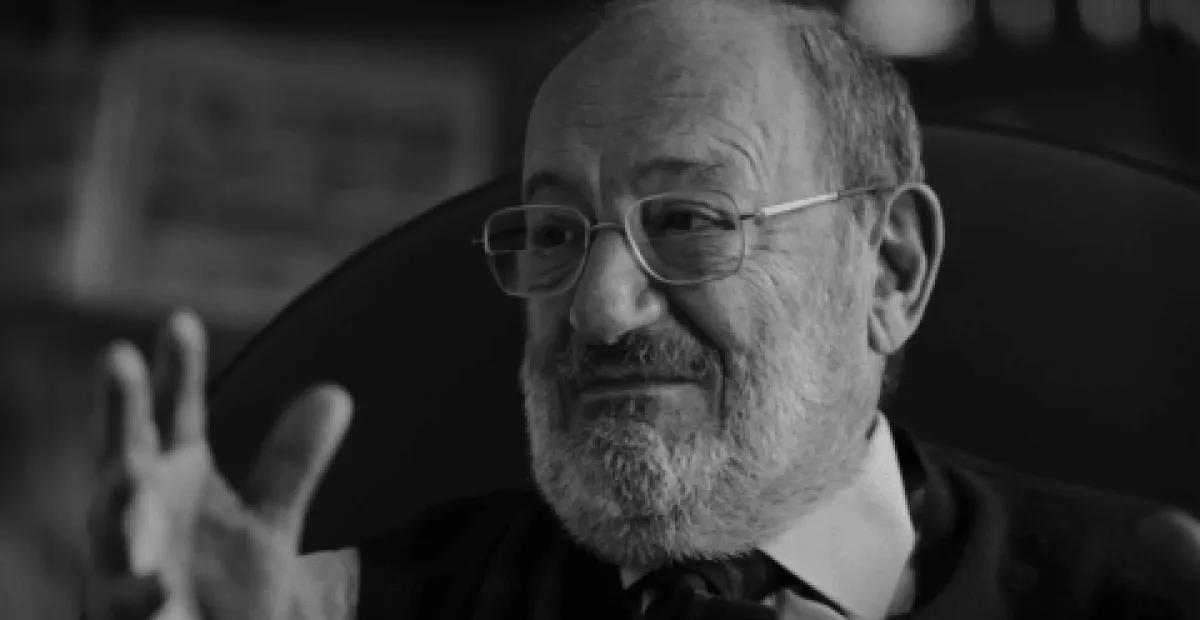Bookworms of the world , unite!

He and I read the same books; only he believed them.
- Umberto Eco on Dan Brown, author of The Da Vinci Code
A man walks among the narrow, winding rows of books in a huge library. He goes into one of the several rooms and selects a book.
Umberto Eco - A Library of the World | ITA 2024 | 80 minutes
This man is none other than Umberto Eco, the philosopher, semiologist and writer from Bologna, who died in 2016 but is brought back to life in this film. He moves with the greatest of ease and familiarity through these study rooms of his, which contain in excess of 30,000 books, including over a thousand extremely rare bibliophile volumes on often rather strange topics. The books are arranged according to a special system known only to the late master himself.
This already brings to mind the "Library of Babel", which the Argentinian Jorge Louis Borges once wrote about and which Umberto Eco described in his most famous book The Name of the Rose.
Fatal and fascinating: "The Name of the Rose"
In his film Umberto Eco - A Library of the World, Italian director Davide Ferrario invites us into this private cave of Umberto Eco. Ferrario once curated an art installation with Eco for the Venice Biennale and made numerous film recordings with the philosopher. In this film, he draws on this treasure trove. He also includes excerpts from interviews that Umberto Eco has given in recent years, as well as quotes from lectures and symposia. They show the range of interests of this Italian polymath, who was best known for his novel The Name of the Rose, which he considered the weakest of his six books.
On the other hand, as is also mentioned in the film, the worldwide success of Eco's book, which was double-edged for him but fascinating for others, had at least one happy side effect: the previously small circle of readers worldwide who were interested in contemporary Italian literature and philosophy up until the 1980s, expanded rapidly.
Trust in the readers
Whether novels or non-fiction, Umberto Eco's works are always intellectual fairy tales, well-told imaginative stories and parables about modern man. At the same time, Eco was a philanthropist: this author does not lecture his readers, nor does he interpret his own work himself. He knew that it was ultimately up to the reader. And Eco had faith in the reader.
Ferrario's film is a comprehensive portrayal of its subject, simultaneously serious and light-hearted. It approaches Eco's world with a standard overview of his works and their main themes, from the perspective of his collection of books and manuscripts, carefully assembled over decades of wide-ranging intellectual activity. The treasure at the centre of this library is not, as one might expect, the works of the most widely celebrated minds in human history, but the books of unknown, largely forgotten, European intellectuals of the 17th and 18th centuries.
The Sense and Senselessness of Collecting
Why is this so interesting to Eco? What interests him about works that even experts have forgotten? For Umberto Eco, the library is a metaphor for the world itself, the material symbol of collective memory. A metaphor for the knowledge of God. The failed intellectual efforts of past centuries are worth as much as the most important books in human history. Following Dante and Borges, Eco sees the library as the source of knowledge, a labyrinth of the human mind as it attempts to grasp reality in its many dimensions. The function of memory is to preserve and select what to keep and what to forget. Collecting indiscriminately can lead to difficulty in thinking straight and making sense of things. However, his huge library, consisting of far more works than a person could read in a lifetime, is proof that books can also be collected without ever being read.
Eco also scoffs at the fact that some modern texts, not yet 20 years old and only saved on computer disks, are more difficult to access today than medieval tomes. Works are becoming more and more ephemeral. They multiply exponentially, but fall into oblivion just as quickly.
The filmmaker also positions six actors at various points who speak, read or recite excerpts from Eco's works and bring this author's erudite yet highly accessible language to life. These short excursions into Eco's inner library, accompanied by Carl Orff's music, also serve to showcase several libraries where books are kept as guardians of human memory, for the joy and happiness of present and future generations of readers.
To be human is to tell stories
This film is a double hymn to the universe of books. On the one hand, Eco cannot be understood without his library. This was the environment in which his ideas, stories and thoughts were born and here, you can explore Eco's inspiring worlds of thought in depth.
For Umberto Eco, being human meant telling stories, and reading meant being alive. We live with stories. They guide us and explain the world to us.
Originally, the film was only intended to document the library before it's relocation, when it was handed over to the Italian state.
In the magical cosmos
So this is also a reflection on the importance of books and libraries in our lives and an acknowledgement of the immeasurable heritage they preserve for future generations - a hymn to a magical cosmos of knowledge and memories.
The film, which is divided into chapters and an epilogue, is an accessible and lively introduction to this thinker, whose views on the Internet and conspiracy theories are still highly contemporary and necessarily sharp today.
So this is more than just a commemoration of a popular writer and active thinker, but in keeping with this week's Leipzig Book Fair, a homage to books and the joys of reading.
Bookworms of the world, unite!



